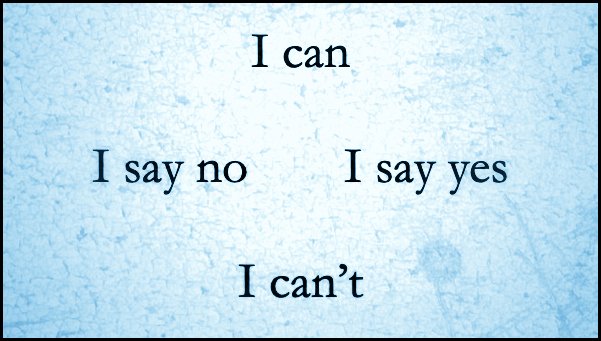Your ability to do something is closely connected with your willingness to do it. Very often, when people say “I can’t do that” they really mean “I’m not willing to do that.” I think it’s useful to see or perceive the distinction between two types of “I can’t,” and their corollary, the two types of “I can.”
I apologize for using a relatively complicated word this early in the post. Corollary is “an idea that naturally flows from a different idea, maybe because of a parallel linkage, let’s say.” It also means “Pedro, why do you keep inflating your linguistic balloon? Go TikTok yourself!”
I apologize for having apologized.
Back in my native land, Take-off-your-bra-bra-zil, I had English classes in secondary school and in high school. How well do you learn a language if you don’t immerse yourself fully in the learning of it? When I was 19, I landed in the US for my university studies and found out the bitter truth. I understood little and spoke even less. Listening to my colleagues and not understanding them, I thought that the word “stuff” (which I wasn’t familiar with) was probably a swear word. “You’ll sink or swim,” I remember a friendly colleague telling me during Orientation Week, the first week of the first semester of the first year of my kicking-and-screaming attempt to grow up. Sink or swim? What is that supposed to mean??????
Growing up remains to be tackled, but at least I swam and learned English: “Me speak English goody, sehr sehr gut!” Later on I learned French, which I speak about as well as I speak English. Now I’m learning Spanish, and getting comfortable with it. Here’s an example: “Buenos días, señor.”
There is a vast number of languages that I don’t speak, including many about which I know literally nothing. I can’t speak Khowar, Maiya, or Komi, and I don’t even know where they are spoken. I plucked them from an Internet list of languages in danger of extinction.
But here’s the thing: I’m willing to make a fool of myself and pretend to speak Khowar. I’ll make funny sounds and faces. Gestures, postures, emotions. I’ll start crying, then I’ll do jumping jacks while singing “Ô Khowar Land of Purple Mangoes,” the national anthem. It’s all phony and it has nothing to do with Khowar, but I say “yes” to playacting and hallucinating, to suspending my discernment and my judgment, to lowering or even extinguishing my standards. Yes, I can speak Khowar!
Then I’ll go on YouTube and see what Khowar actually sounds like. I’ll find some wonderful clips right away, and I’ll regret having made jokes about a foreign culture, even though I used the word “Khowar” as nothing but a trigger for improvisation. The trigger could have been “Flemish,” or “Appalachian,” or “Brasiloser” (which I speak pretty well, actually). (I had some Brasiloser ancestors.) (They slipped coming out of the shower, fell, broke their necks, and died.) (Together.) (Brasiloser family life is . . . you know . . . very intimate.)
Let’s lay out a quaternity: two groups of two elements each, arranged like a cross or like the four cardinal points. The elements within a group are closely related, similar to Brasiloser cousins. The two groups are in some sort of dynamic pull, interacting with each other. Structured in this manner, a quaternity delineates a territory in which you find out who you are. What’s your relationship with “I can” and “I can’t”? What’s your relationship with “I say yes” and “I say no"? These relationships interact in a lot of complex ways, and they determine many things in your life. Many things, most things, maybe everything in your life.
I really, really, really can’t speak Khowar and probably never will. In some situations today, I feel nervous about speaking Spanish, because—well, I have bouts of self-conscious standards. Perfectionist worrying about other people. Comfort zone issues. Temporary shyness. Hypoglycemia. I Have My Reasons Syndrome. ¡Tarado de mentecato de badulaque de babieca de bodoque de barbeta! (This is “Pedro” in Spanish.) (I looked it up.)
Can I or can I not speak Spanish? Precisely.
“I can and I can’t,” “I say yes and I say no” are intertwined in the realm of identity, where reason and unreason take a shower together and slip on the soapy surface, sometimes breaking their necks and sometimes aguamoosing.
Translation, please! In life, few things are straightforward. Ultimately, it’s quite heroic to dwell in the demanding quaternity of “I can and I can’t,” having to make endless “I say yes or I say no” decisions that affect you and everyone else around you. In Brasiloser, “life” is pronounced “soapy can-can’t cha-cha-cha.” It’s the most dangerous and the most exhilarating of all dances.


